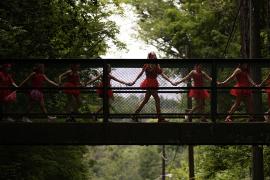Because frontline staff, such as cabin counselors or activity leaders, typically spend the most time directly with campers, most accidents involving campers occur under their care. Therefore, it is critical that those who supervise frontline staff have the skills, knowledge, and capacity to recognize, address, and prevent actions that may put campers at risk.
At many camps, this responsibility falls to staff in entry-level management positions, such as head counselor or program area supervisor. Frequently, supervisory staff are college-aged — typically within the same age range as those they are supervising, with little experience in supervisory responsibilities. While promotion to entry-level management positions for those with limited experience is also common in other “first employer” industries, such as food service or retail sales, the risks for camps that do this can be much higher — because camps have the inherent responsibilities of safeguarding the lives of participants and managing a greater level of risk than generally occurs in other jobs.
Analysis of the common types/causes of camp accidents indicates that risk management must include active, ongoing supervision of the frontline staff who directly supervise campers. To be most effective, mature, responsible adults are needed in those roles.
Additionally, several factors can cause or contribute to accidents when young supervisors are in roles that include supervising frontline staff:
Poor decision-making resulting from young staff without the maturity and/or experience to enforce rules or correct the behavior of their peers
Failure to ensure that frontline staff are properly supervising campers/participants
Failure to communicate, train, or enforce policies/procedures/rules with frontline staff
Lack of the certification/training/experience/knowledge to properly supervise the staff, recognize hazards, or assess risk in the assigned areas/activities
To better manage these risks and prevent accidents from occurring as a result of these factors, camps that hire young and/or inexperienced staff in supervisory roles must have a well-thought-out plan for careful selection, training, and ongoing supervision.
Carefully Select Supervisory Staff
Consider Maturity
People’s brains don’t reach maturity until around ages 24 to 30. Thus, challenges younger staff face in supervisory roles are often due to the developmental age of their minds, which plays an important role in processes like planning, decision-making, impulse control, understanding consequences of actions/behaviors, and reasoning. Because they cannot fully understand cause-effect relationships, they may not be equipped to evaluate the consequences of actions, or weigh information — such as risk — the same way mature adults do. A heightened level of “invincibility” and risk-taking is also common, so staff may assess that certain behaviors are “not a big deal,” look at risks as ones they are personally willing to take, or judge rules/policies in camp as unnecessary or restrictive. Staff may not always understand how actions or decisions affect a camper’s safety and well-being — or the quality of the program. Put simply, good judgment isn’t necessarily something they are biologically prepared to demonstrate.
Before bringing on young staff in supervisory positions, directors should carefully consider the applicant’s capacity in implementing the specific responsibilities of the position. This may include such things as their ability to:
- Supervise assigned staff
- Enforce the camp’s personnel policies and rules for staff conduct
- Maintain an environment that supports the campers’ physical and emotional safety
- Guide other staff in decision-making
- Model the types of behaviors that are expected to be practiced by campers and staff
Select Qualified Program/Activity/Area Supervisors
To ensure areas/activities are operated in a safe manner, supervisory staff should have the right combination of training, education, experience, and relevant certifications specific to the areas/activities being conducted; the locations/environments; and the types of equipment being utilized. As applicable, supervisory staff should:
- Be certified or experienced at a level that is higher than those they are supervising
- Have experience in the management of the areas/activities
- Be able to demonstrate competence at a level greater than cursory knowledge
For example, having a lifeguard certification does not qualify someone to supervise other lifeguards or to manage the camp’s aquatics activities or areas.
Accidents often occur because young supervisors lack the experience or knowledge to properly oversee staff, recognize hazards, or assess risk in the areas/activities to which they are assigned. Camps should never expect supervisors to oversee program areas or activities outside their scope of training, knowledge, or experience. Likewise, certification in a similar area should never be “applied” beyond its intended scope. For example, having a lifeguard certification doesn’t mean that person is also qualified to teach swimming lessons or safely supervise boating activities. Also, just because an individual can do an activity themselves — like swim, ride, climb, paddle, shoot, etc. — does not translate to having the knowledge to recognize hazards, mitigate risks, or supervise that activity at the level expected when caring for campers. (Additional information and recommendations regarding supervisor qualifications can be found on the American Camp Association website, as well as in the ACA Accreditation Process Guide.)
Training Supervisory Staff . . .
. . . To Make Decisions
Supervisors and frontline staff often have the greatest capacity to prevent accidents through their day-to-day decision-making. So it is critical that training for young supervisors includes topics that help them understand decision-making processes — cause-effect relationships (every decision/action has a consequence), policies and rules enforcement, and addressing the common types of decisions they may need to make. Training should also provide the tools and skills needed to support decision-making by the staff they are supervising. For instance, as it’s not unusual for frontline staff to make decisions based on what is popular among campers, supervisors must know how to recognize and stop unsafe behaviors and be able to help staff consider what is appropriate and safe.
An effective way to reduce the opportunity for errors (risks) in decision-making by young or inexperienced staff is to limit the types of decisions they can make. Do this by mandating which decisions first require permission, setting limits for decisions that would modify how activities are conducted or supervised, and carefully defining situations in which staff are empowered to make decisions that are responsive or intended to enhance safety, such as increasing the number of staff supervising an activity under certain circumstances.
Implementing standard operating procedures (SOPs), along with providing supervisory staff with checklists, process charts, or other decision-making tools, are effective ways to manage staff strategies. By implementing SOPs, camps can specifically address the who, what, when, where, why, and how for each activity/area/subject to reduce the types of decision-making that may be required of staff, in turn reducing opportunities for accidents and injuries.
. . . To Improve Supervision of Frontline Staff
From the pool to the playground, all of the SOPs become irrelevant when frontline staff aren’t actually supervising the participants. Specific to their roles, training for those who oversee frontline staff should include:
- Understanding active supervision and its importance in accident prevention
- How to best enforce the rules
- How to recognize when frontline staff are losing focus and are no longer attentive, active, or intentional in their supervision of campers
- When necessary, how to intervene and correct
It’s also important that supervisors understand how to help frontline staff recognize and respond to unsafe camper behaviors such as wandering off, aggression, fighting, and dangerous risk-taking — and how to protect campers from harm.
Supervisors should also be trained to ensure that frontline staff are always in proximity to campers, positioned to continuously monitor all who are in their care. Counselors and other frontline employees should consistently watch, count heads, and listen, staying close to campers who need additional support — including when campers are required to be “at arm’s length” — and keeping spaces between staff and campers clear and free of equipment so there is nothing blocking visual surveillance or in the way of potential emergency response. Additionally, supervisors should enforce rules designed to help frontline staff avoid distractions, such as refraining from casual conversations with other staff or electronics use while on duty. As applicable, supervisors should also enforce eliminating any barriers to frontline staff’s ability to hear campers, including loud music or headphone use and closed cabin/room doors.
. . . To Communicate Policies and Procedures
Without understanding the camp’s policies and procedures, along with their role in enforcement, supervisory staff can’t fully perform their jobs. Camps should have a comprehensive training plan for how policies and procedures are disseminated, whether through staff manuals, operating guides, covered within training content, or a combination — as well as how frontline staff are trained to meet them. Supervisors should also be educated on how these are to be monitored, evaluated, and enforced. A lack of information and training can literally become a life-and-death issue at camp when staff don’t know how to respond to emergencies. Therefore, supervisors should understand everything that applies to their roles, including healthcare policies and emergency care protocols. Training should also provide both supervisors and frontline staff hands-on practice of emergency procedures.
. . . To Enforce Rules with Frontline Staff
Just as frontline staff should maintain consistent and clear rules and boundaries for camper behavior, supervisors should do the same for the staff they supervise — including peers. Failure to address and correct inappropriate staff conduct often sends the message that rules are not really rules — which can become a critical issue when said rules pertain to camper safety or impact camper supervision.
Training for supervisors should include how to handle any difficult situations they may encounter involving staff conflicts or confidentiality. They must also be clear on their role in staff discipline to address conduct that undermines relationships between staff (gossiping, bullying, cliques, etc.). At the same time, they must maintain respect for camp administration and/or business operations and their supervisory relationship with staff-peers.
. . . To Enforce Rules with Campers
Frontline staff often feel pressured to make decisions based on what is popular and attractive to their campers, which is sometimes contrary to what is appropriate and safe. When this occurs, supervisors need to help frontline staff enforce rules to prevent injuries and ensure they don’t succumb to camper pressures. Supervisors’ training should also include how to assist frontline staff in:
- Prioritizing safety
- Setting consistent limits
- Finding camp-acceptable ways to say no or redirect campers
- Responding to camper manipulation and other sticky situations
Ongoing Supervision of Supervisors
Camps that hire young adults in supervisory roles must have a well-thought-out plan for their ongoing supervision. While there is a fine line between micromanaging and problem-solving, to be most effective young supervisors require consistent supervision, coaching, and feedback. In part, this is because being a first-time supervisor can be one of the most challenging jobs at camp. Jumping on the management track often means they were once among the employees (peers) they now must supervise.
When young staff are transitioning to being supervisors, upper-level staff need to take the time to help them learn their new roles and responsibilities. Even if they have been at camp before, never assume staff understand the expectations of the position or how to do specific tasks. Schedule time to explain, demonstrate, and teach. This includes helping them with such activities as defining and assigning priorities, planning and organizing, and coordinating the operating tasks of staff/areas/departments so that the objectives of the camp as a whole are achieved.
As a matter of risk reduction, young supervisors should never be overextended; they should never be given the responsibility of overseeing more staff or activity areas than they are ready or able to handle effectively. Ensure that young supervisors with responsibilities for multiple staff, areas, or departments have ample time to be physically present with their direct reports and at each area on a regular basis to observe staff and activities being conducted. They should also frequently check in with their supervisors to talk about how things are going, problems encountered, concerns, status of projects, and so on. And, of course, they should be encouraged to ask for feedback and suggestions.
Photo courtesy of Camp Wekeela, Hartford, ME.
Diane Tyrrell, CCD, MA Ed, has over 30 years of professional experience working within the camp, youth development, and education fields with for-profit and nonprofit camps and organizations. Diane is the CEO of Frog Pond Consulting, providing integrated solutions to help meet ever-changing marketplace challenges for schools, camps, recreational facilities, and nonprofit organizations. She can be reached at [email protected].



